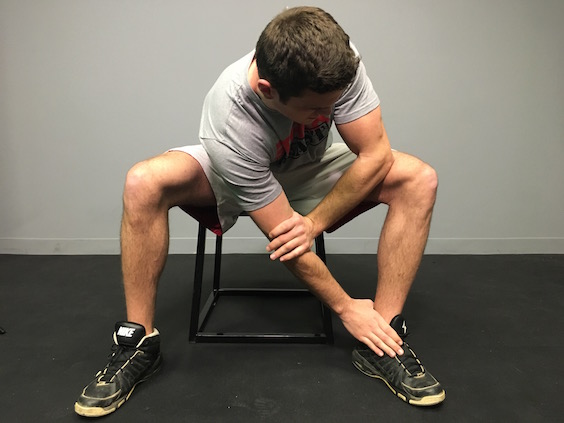Why Female Athletes Can’t Afford to Ignore the Warning Signs of an Absent or Irregular Cycle
Ladies, I know we don’t like to talk about “that time” of the month.
But here’s the truth: Your menstrual cycle DOES impact performance…and that’s COMPLETELY NORMAL.
We saw this topic front and center in the media at the 2016 Summer Olympics when swimmer Fu Yuanhui gave an amazingly candid response to a reporter who innocently asked why she was holding her stomach after the women’s 4x100m medley relay.
“My period came last night and I’m really tired right now!” Yuanhui, who’d won a bronze medal in the 100-meter backstroke a few days earlier, responded.
The world blew up with praise; it’s just not something we talk about! And the fact we don’t talk about it can cause many female athletes to underestimate the important relationship between their cycle and their athletic performance.
A consistent menstrual cycle is the body’s way of indicating it is healthy enough to develop a baby. An irregular or completely missing period is the body’s way of telling you that all is not OK.
After training hundreds of female athletes, I’ve noticed a huge gap in understanding how the consistency of your period affects your long-term health and performance.
I’ve worked with some women who are relieved when their cycles become less frequent or lighter. They even believe that it’s a sign they are finally training hard enough. A sign they’re a real athlete.
This is not true!
Fu Yuanhui did a great service for us ladies, helping to break the dangerous myth that not having a period as a female athlete is a healthy sign.
In this article, we’re going to talk about
- Why menstruation is critical for health and long-term performance.
- What you can do if your cycle has changed since you’ve been training.
Why is Your Period Missing?
The human body is rarely subtle with its warning signs.
It tells you when it needs fuel, when you need a rest day, and how hard you can push without risking an injury. When something isn’t right, it will give you a sign!
High-performing female athletes must learn to be in tune with their bodies. Have you started menstruation but noticed:
- Extremely light periods
- Periods greater than 60 days apart
- Feeling chronically fatigued or exhausted
- Struggling to maintain good muscle tone
- A period that’s disappeared all together
If so, these are huge red flags!
But WHY is your period missing?
Your period is regulated by sex hormones, an imbalance of which affects the regulation and occurrence of your period. Two main factors can impact your body’s ability to maintain proper hormone levels.
1. You are Under-Fueled
Female athletes who are not consuming enough food to match their activity level compromise their hormonal balance.
Chronic caloric restriction is a stress on the body. High levels of stress hormones like cortisol inhibit the body’s main sex hormones, including:
- GnRH: gonadotropin-releasing hormone, which is responsible for the body’s release of other hormones
- LH: luteinizing hormone, which triggers ovulation
- Estrogen and progesterone: two hormones that are critical in reproductive development and fertility
When these hormone levels drop, it suppresses ovulation and throws your menstruation cycle off.
Calorie deficits are necessary for fat loss, but here’s the problem: Most people who use a chronically low-calorie diet are not providing their body with enough macronutrients for vital hormone production and regulation. With many restriction or elimination diets, the amount of energy available for the body is limited. Because your body is adept at adapting to its environment, it adapts to the low-caloric intake by slowing down the metabolic processes not necessary for your own survival. For females, this means ovulation.
Even more, diets chronically low in calories are too often also chronically low in dietary fats like cholesterol, as well as chronically low in carbohydrates. Cholesterol is a precursor for sex hormones. Too little cholesterol results in a decrease in raw material for sex hormone production. Too few carbohydrates results in low LH levels, resulting in ovulation inhibition.
So a missing, extremely light or infrequent period can be a sign that you’re seriously under-fueling your body, which has a massive negative effect on your athletic performance!
If think you are fueling your body adequately but are still experiencing a change in your menstrual cycle, there’s another reason your body might be raising the red flag….
2. Too Much Activity/Not Enough Recovery
You train hard. And, that’s a good thing. Training hard is the only way to really get better.
But your body also needs to recover. If it doesn’t, your body will begin to break down as opposed to respond to the training positively. Female athletes who are subject to a lot of intense training without enough recovery time expose their bodies to high stress levels.
And those higher stress hormones? They make it difficult for your body to regulate ovulation.
Female athletes training double-digit hours per week are exposing their bodies to high amounts of stress and fatigue. To recover from this fatigue, the body needs energy.
Athletes with inadequate sleep and caloric consumption significantly decrease the energy available for recovery. So maybe you’re eating just as much as some other female athletes, but if you’re training twice as hard, that’s not going to be enough!
Female Athletes Need to Prioritize Recovery
What should you do if your periods are off? Your body is telling you it’s time to focus on recovery.
Remember that the two most important factors of recovery are:
- Sleep
- Nutrition
Sleep is when your body is able to reduce fatigue and regulates hormones most efficiently. The body wants to achieve balance, or homeostasis, and it requires sufficient sleep to do so.
When they’re in season, athletes are exposed to much higher levels of fatigue and stress—especially when factoring in school and social life stressors. Fatigue and stress are huge inhibitors of maintaining homeostasis. By adding more hours of sleep per night during the season, your body will be better able to combat this fatigue and promote recovery.
You also need adequate calories to energize recovery. Maintaining homeostasis requires energy. By adding more food to your diet in season, you are ensuring your body is provided the extra energy it needs to repair and recover from the added stress of your season.
When your recovery improves, stress hormones stabilize, allowing your body to return to a more consistent ovulation schedule.
Athletes are always told to listen to their bodies, but female athletes are rarely informed of how the status of their period relates to key factors of athletic performance. When something irregular is happening to your menstrual cycle, you should not just brush it off.
The absence of your cycle can indicate that you are suffering from Female Athlete Triad, a serious condition that can cause loss of bone density, a higher risk of fractures/injury, and saddle you with lifelong health issues. You work too hard for that!
Concerned your menstrual cycle is affecting your performance? After all, even Fu Yuanhui lamented that her relay team’s narrow-miss of the podium during the last Summer Olympics was due, in part, to her period. We know being on your period changes the way you perform, but how?
Stay tuned for another article that will detail:
- How being on your period changes performance
- What you can do to give yourself a boost during menstruation
- Our best tips for both training and playing on your period
HINT: The answer is not using birth control to regulate your cycle!
READ MORE:
RECOMMENDED FOR YOU
MOST POPULAR
Why Female Athletes Can’t Afford to Ignore the Warning Signs of an Absent or Irregular Cycle
Ladies, I know we don’t like to talk about “that time” of the month.
But here’s the truth: Your menstrual cycle DOES impact performance…and that’s COMPLETELY NORMAL.
We saw this topic front and center in the media at the 2016 Summer Olympics when swimmer Fu Yuanhui gave an amazingly candid response to a reporter who innocently asked why she was holding her stomach after the women’s 4x100m medley relay.
“My period came last night and I’m really tired right now!” Yuanhui, who’d won a bronze medal in the 100-meter backstroke a few days earlier, responded.
The world blew up with praise; it’s just not something we talk about! And the fact we don’t talk about it can cause many female athletes to underestimate the important relationship between their cycle and their athletic performance.
A consistent menstrual cycle is the body’s way of indicating it is healthy enough to develop a baby. An irregular or completely missing period is the body’s way of telling you that all is not OK.
After training hundreds of female athletes, I’ve noticed a huge gap in understanding how the consistency of your period affects your long-term health and performance.
I’ve worked with some women who are relieved when their cycles become less frequent or lighter. They even believe that it’s a sign they are finally training hard enough. A sign they’re a real athlete.
This is not true!
Fu Yuanhui did a great service for us ladies, helping to break the dangerous myth that not having a period as a female athlete is a healthy sign.
In this article, we’re going to talk about
- Why menstruation is critical for health and long-term performance.
- What you can do if your cycle has changed since you’ve been training.
Why is Your Period Missing?
The human body is rarely subtle with its warning signs.
It tells you when it needs fuel, when you need a rest day, and how hard you can push without risking an injury. When something isn’t right, it will give you a sign!
High-performing female athletes must learn to be in tune with their bodies. Have you started menstruation but noticed:
- Extremely light periods
- Periods greater than 60 days apart
- Feeling chronically fatigued or exhausted
- Struggling to maintain good muscle tone
- A period that’s disappeared all together
If so, these are huge red flags!
But WHY is your period missing?
Your period is regulated by sex hormones, an imbalance of which affects the regulation and occurrence of your period. Two main factors can impact your body’s ability to maintain proper hormone levels.
1. You are Under-Fueled
Female athletes who are not consuming enough food to match their activity level compromise their hormonal balance.
Chronic caloric restriction is a stress on the body. High levels of stress hormones like cortisol inhibit the body’s main sex hormones, including:
- GnRH: gonadotropin-releasing hormone, which is responsible for the body’s release of other hormones
- LH: luteinizing hormone, which triggers ovulation
- Estrogen and progesterone: two hormones that are critical in reproductive development and fertility
When these hormone levels drop, it suppresses ovulation and throws your menstruation cycle off.
Calorie deficits are necessary for fat loss, but here’s the problem: Most people who use a chronically low-calorie diet are not providing their body with enough macronutrients for vital hormone production and regulation. With many restriction or elimination diets, the amount of energy available for the body is limited. Because your body is adept at adapting to its environment, it adapts to the low-caloric intake by slowing down the metabolic processes not necessary for your own survival. For females, this means ovulation.
Even more, diets chronically low in calories are too often also chronically low in dietary fats like cholesterol, as well as chronically low in carbohydrates. Cholesterol is a precursor for sex hormones. Too little cholesterol results in a decrease in raw material for sex hormone production. Too few carbohydrates results in low LH levels, resulting in ovulation inhibition.
So a missing, extremely light or infrequent period can be a sign that you’re seriously under-fueling your body, which has a massive negative effect on your athletic performance!
If think you are fueling your body adequately but are still experiencing a change in your menstrual cycle, there’s another reason your body might be raising the red flag….
2. Too Much Activity/Not Enough Recovery
You train hard. And, that’s a good thing. Training hard is the only way to really get better.
But your body also needs to recover. If it doesn’t, your body will begin to break down as opposed to respond to the training positively. Female athletes who are subject to a lot of intense training without enough recovery time expose their bodies to high stress levels.
And those higher stress hormones? They make it difficult for your body to regulate ovulation.
Female athletes training double-digit hours per week are exposing their bodies to high amounts of stress and fatigue. To recover from this fatigue, the body needs energy.
Athletes with inadequate sleep and caloric consumption significantly decrease the energy available for recovery. So maybe you’re eating just as much as some other female athletes, but if you’re training twice as hard, that’s not going to be enough!
Female Athletes Need to Prioritize Recovery
What should you do if your periods are off? Your body is telling you it’s time to focus on recovery.
Remember that the two most important factors of recovery are:
- Sleep
- Nutrition
Sleep is when your body is able to reduce fatigue and regulates hormones most efficiently. The body wants to achieve balance, or homeostasis, and it requires sufficient sleep to do so.
When they’re in season, athletes are exposed to much higher levels of fatigue and stress—especially when factoring in school and social life stressors. Fatigue and stress are huge inhibitors of maintaining homeostasis. By adding more hours of sleep per night during the season, your body will be better able to combat this fatigue and promote recovery.
You also need adequate calories to energize recovery. Maintaining homeostasis requires energy. By adding more food to your diet in season, you are ensuring your body is provided the extra energy it needs to repair and recover from the added stress of your season.
When your recovery improves, stress hormones stabilize, allowing your body to return to a more consistent ovulation schedule.
Athletes are always told to listen to their bodies, but female athletes are rarely informed of how the status of their period relates to key factors of athletic performance. When something irregular is happening to your menstrual cycle, you should not just brush it off.
The absence of your cycle can indicate that you are suffering from Female Athlete Triad, a serious condition that can cause loss of bone density, a higher risk of fractures/injury, and saddle you with lifelong health issues. You work too hard for that!
Concerned your menstrual cycle is affecting your performance? After all, even Fu Yuanhui lamented that her relay team’s narrow-miss of the podium during the last Summer Olympics was due, in part, to her period. We know being on your period changes the way you perform, but how?
Stay tuned for another article that will detail:
- How being on your period changes performance
- What you can do to give yourself a boost during menstruation
- Our best tips for both training and playing on your period
HINT: The answer is not using birth control to regulate your cycle!
READ MORE:












